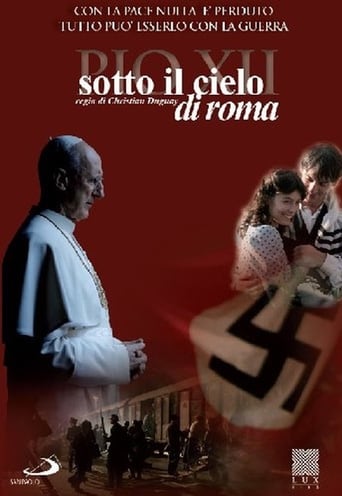mallorymay
For 7 years I have researched Pope Pius XII's record during WWII, concentrating on the 1943-1944 period of German occupation of Rome. I have translated little-known documents in six foreign languages as well as English. I used that background to write a novella, "Silent Rescue," about what the Pope really did to help rescue the Jews during the Nazi occupation of Rome ("Silent Rescue," volume 1, on Kindle). Then I wrote a long book to show the research behind the novella ("Silent Rescue," volume 2, also on Kindle). The TV movie, "Sotto il Cielo di Roma," is well-intended and shows that the Pope would have made a public protest against the roundup of the Jews, as he threatened to do in the letter that he had Bishop Hudal send to General Stahel. But it is more complicated than that.The Pope and General Stahel had learned from the tragic example of the Dutch bishops in 1942, that such a protest would only provoke Hitler to kill even more Jews. The movie accurately shows the Pope burning his fiery protest against the Nazi extermination of the Jews as a result in 1942. There were three witnesses in the room to that action.What the TV movie leaves out is the fact that General Harster (absent from the TV movie) had been in charge of annihilating all the Dutch Jews in that reprisal in 1942. When the Nazis occupied Rome, Harster was also in charge of carrying out the Final Solution in Italy, to round up the Jews in Rome. It would have been entirely in character for Harster to carry out a savage reprisal if the Pope had made a public denouncement of the Nazi roundup of the Jews, like the Dutch bishops.The Pope had Bishop Hudal send a letter to General Stahel, threatening to make a public outcry anyway unless the roundup in Rome was ended. This alarmed General Stahel, who was aware of General Harster's role in the situation. He told Fr. Pfeiffer that it would be counter productive for the Pope to make any public protest. Instead General Stahel went over Harster's head and got Himmler to call off the roundup. But General Harster wanted revenge, so he met with General Wolff a few days later in Rome, and within a week General Stahel was fired. It cost Stahel his job and he ended up on the front lines in Russia. The Pope had learned his lesson – don't do as the Dutch bishops! 84% of Dutch Jews were killed. 84% of Italian Jews were rescued.
David Orr
I give this film 3 stars only because it has a fairly well-dramatized screenplay, even though the story is utterly wrong in the way it portrays what Pius actually DID. There's lots of good (and recent) historical research that exposes Pius's unpious approach to dealing with Hitler. The director and writers of this film should have done some homework.Or maybe that's what they did NOT want to do? Maybe this film is a conscious propaganda effort seeking to whitewash the church's failure to oppose fascism. Pius not only did not oppose Hitler, he was in league with Mussolini! There's new research documenting that, too.All in all, I would say that this film is little more than a feel-good P.R. film for the Catholic Church. Take it for what it is.
Bob Shank
In spite of being a 'foreign films' fan, I hadn't been aware of this 2 episode 2010 release until an old girl-friend brought it to my attention on Netflix live streaming. Dragged kicking and screaming into it, I eventually found myself totally captivated with the history and directing. I've always been a James Cromwell follower, even though he often plays the dirty fellow. But in this release he has absolutely nailed-down a reversal in rolls with a deeply-convincing performance. OK, so there were a few lame efforts from less-than-perfect actors, but the intent was right there in your face. And in my humble-but-most-accurate opinion, all parts were sincere and played well into the story. I thought, in my 6 decades of viewing, some of the scenes were 'world class.' Especially near the end, Part 2, with the Pope face-to-face, alone, with the German officer responsible for many of the atrocities). Up until now, I had been totally unaware of this side of the Catholic efforts during WWII in Rome (I'm a Baptist), and was amazed to find myself fascinated with the depicting of it in this most appreciable movie. I think the history of this film, and its depiction, should be viewed by all serious movie fans and historians. It's worth the kicking and screaming.
sampson-8
Regardless whether the acting and the special effects were scanty or not, the history depicted was fascinating and disturbing. Not many stories about this awful time are out there that I know of. The ruler of the Catholic Church v.s. the nazi madman. I thought the film did a good job of showing the Pope's agony over what to do. Besides the fear of Hitler's reprisals, the waffling and indecision among his own rank and file was clearly stated. The German soldiers may have been played over-the-top in their brutality and sinister doings, but how else to portray these thugs who sent thousands to their death. Even though these stories may be presented in less than a first-rate production, at least the folks that made this film brought to the screen a bit of history that needs oft to be repeated.
